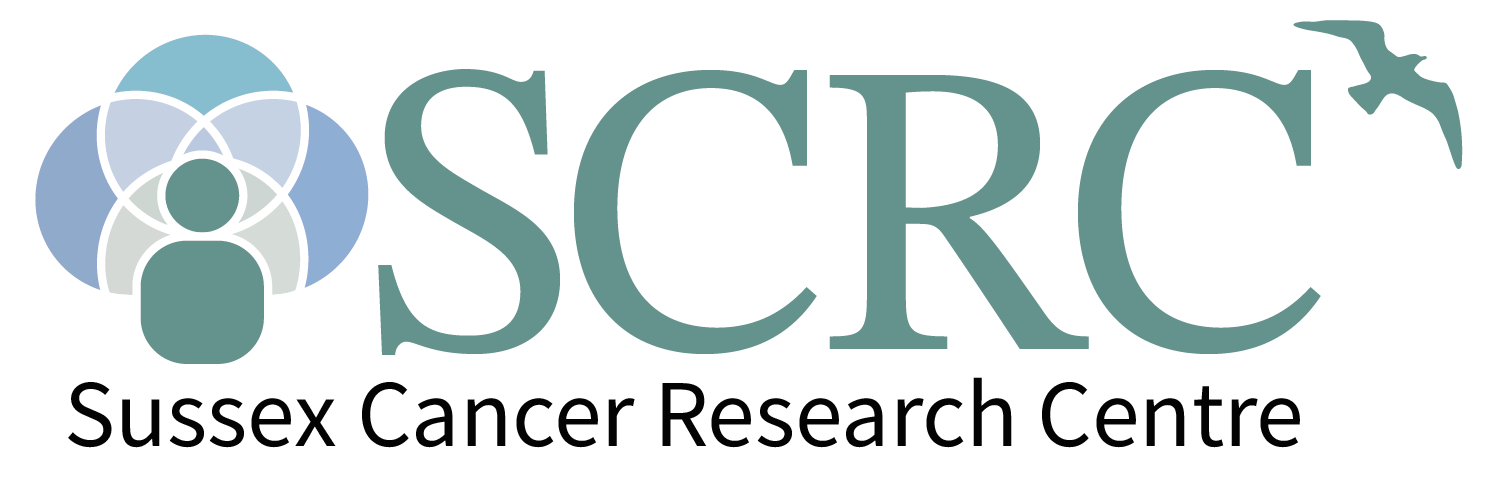
The new Sussex Cancer Research Centre, SCRC aims to expand translational research and to facilitate interactions between individuals across our supporting Institutions.
We aim to support research across the translational pipeline from bench to bedside, with a focus on improving patient outcomes.
Deadline: 1st February 2026
The aim of the Sussex Cancer Fund SCRC awards is to provide funds to support innovative, and impactful cancer research. Projects we support may be too preliminary for competitive major research support but have the potential to be so with this investment (≤ £10,000 or ≤ £30,000). These awards are most suitable to projects where researcher time is costed elsewhere, but “consumables” funding is required. Projects may alternatively require additional investment to translate findings into patient benefit.
In this call we particularly welcome applications that address any of the following priority areas:
AI/data-science approaches applied to cancer research
The use of established datasets/resources (e.g. Our Future Health, the UK Biobank)Cancer prevention (e.g. diet, exercise), early detection, rapid diagnosis, or contributors to long wait times.
Mental health and cancer
Applications for the SCF:SCRC awards are reviewed by independent experts and a multidisciplinary research committee. The projects are ranked on criteria including:
Potential impact on cancer patients.
Research quality.
Research originality.
Alignment with priority areas.
Research Team.
Examples of strong research teams include:
Track Record of excellence and impact.
New and promising collaboration being enabled by the award.
Support for promising talent to flourish in Sussex.
University – Clinician collaborations.
The SCF:SCRC awards have been made possible through support from the Sussex Cancer Fund and all their donors. Through this scheme the SCRC aims to facilitate interactions between individuals across our supporting Institutions thereby expanding translational research to benefit people with cancer.
Our Funded Projects
Inaugural SCRC PhD Studentship
We’re excited to announce the award of the first Sussex Cancer Research Centre studentship to an exciting new collaboration between the Pearl Bioinformatics Laboratory, at the University of Sussex, the “Cancer of Unknown Primary” team at the University Hospitals Sussex NHS Foundation Trust, Brighton and Sussex Medical School, and the East Sussex Healthcare NHS Trust.
This interdisciplinary project aims to use the latest advances in artificial intelligence (AI) to find personalised treatment targets for people with cancer where the primary site of the disease is difficult to determine. The unique combination of advances in AI, the ability to rapidly sequence the genome of cancers, and a unique bench to bedside team assembled across Sussex has the potential to revolutionise the treatment of these cancers.
The project “AI solutions to guide treatment strategies for Cancers of Unknown Primaries (CUPs)” is led by Frances Pearl, Laurence Pearl, Max Whitley, and Eleni Ladikou, and was supported by both the University of Sussex and Brighton and Sussex Medical School.
SCRC Pump-priming awards
Thanks to the generous support of The Sussex Cancer Fund, The University of Brighton, Brighton and Sussex Medical School, and the University of Sussex, we have made five awards to kick-start exciting new collaborative research projects across Sussex. These diverse research projects span from bench to bedside and all share the potential to unlock new treatment approaches for multiple cancer types.
Explore our pump-priming projects
-
Our brain constantly processes information coming from our senses. According to new scientific models, when impaired, these processes lead to feeling fatigued. While people with and beyond cancer are likely to experience fatigue, these models have yet to be tested in cancer patients. This project will investigate sensory information processing and fatigue in people with cancer and healthy participants. This project will also examine immune profiles to try and identify causes of fatigue.
This project establishes a new team consisting of an oncologist, psychiatrist and researchers from across Sussex. The team also have access to new facilities to enable research in partnership with people who live with and beyond cancer.
Cancer-related fatigue is recognized as a significant and distressing symptom and both causes and management strategies are key research priorities in the UK. This project will enable us to study its cause so patients and carers can understand the symptom better, allowing for the development of interventions to help all beat it.
Project Lead: Dr Jeanne Dekerle, Reader, School of Education, Sport and Health, University of Brighton
-
Diffuse large B-cell lymphoma (DLBCL) is the most common type of blood cancer. While standard treatment works for about 60% of patients, 40% either do not respond or experience relapse, highlighting the need for better treatment options. One major reason for treatment failure is that some cancer cells can survive therapy (drug resistance). These surviving tumour cells are often supported by the “normal” cells surrounding the tumour, known as the tumour microenvironment (TME), which help the tumour survive and grow.
This project works toward bringing a new combination treatment to DLBCL patients. Through new methods that enable the investigation of interactions between cancer and TME, this project will test our promising new drug combination, paving the way for potential clinical trials.
Project Lead: Dr Fabio Simoes, Assistant Professor in Cancer Research at Brighton and Sussex Medical School
-
People who undergo colorectal cancer surgery do better if they are physically active. This project is the first step in the development of an inclusive intervention, to help less active people, get active. We aim to collect information about activity to ‘co-produce’ a user-friendly activity intervention. This will be through partnering with patients, the public and health care professionals.
This project will engage people who’ve had colorectal cancer surgery to understand how we could improve outcomes with physical activity. It will focus particularly on technology (e.g. smartphones), to see if they could help. This project will also work with people who have had colorectal cancer surgery to determine what they think are important goals to achieve and what a good recovery looks like.
Colorectal cancer is the fourth most common cancer in the UK. For physical activity, the biggest benefit is moving people from being inactive to doing even light activities. Therefore, this project will focus on this group and aims to support patients to be best prepared for surgery. As a result, they would be more likely to recover well. This will benefit both individuals and the wider health service.
Project Lead: Dr Luke Hodgson, Intensive Care and Respiratory Consultant - Worthing Hospital
-
The DNA in human cells is regularly damaged, even by the body's normal cellular processes. A DNA break in a chromosome can be caused by environmental exposure to radiation and chemicals but may also result from cell metabolism. Left unrepaired or incorrectly repaired, this may have the potential to cause and drive cancer. Fortunately, the body has sophisticated pathways to repair damaged DNA, but these are often altered in cancer to help tumours grow or resist chemotherapy and radiation treatment. Some cancers suppress the DNA repair system to allow cancer cells to divide with markedly damaged chromosomes. Ovarian cancers make use of a specific protein, which allows them to ignore DNA repair systems. Blocking or removing this protein from ovarian cancer cells makes them more susceptible to dying with chemotherapy and can reduce tumour growth. Despite its promise we do not understand, at an atomic level, what this protein looks like and how it works. Such information is critical for the discovery and development of intelligently designed drugs. We are aiming to find vulnerabilities in this protein that we can exploit for drug development. This could form the basis for a new class of chemotherapies to treat and cure the disease. Resistance to chemotherapy is a problem for ovarian cancers, therefore new therapies are much needed.
Project Lead: Dr Luke Yates, Assistant Professor in Genome Stability, Genome Damage and Stability Centre, University of Sussex
-
Acute myeloid leukemia (AML) is an aggressive type of blood cancer that produces defective immature white blood cells which eventually lead to bone marrow failure. Adults and children can get AML, but typically this disease is diagnosed in older people. There is an urgent medical need for alternative targeted treatments with reduced side-effects.
Most AML cases present with overexpression of a cancer-promoting protein called beta-catenin yet there remains no approved drug that targets beta-catenin. Beta-catenin promotes leukemia by interacting with other proteins, so our lab investigated these partner proteins and discovered a new family of partner proteins.
This project will exploit the expertise of multiple institutes within the Sussex Cancer Research Centre to discover the overall level of these new protein partners in leukemia patient samples, their contribution to healthy blood and AML development, and how they regulate the signalling in AML cells. This initial information will allow us to design a new class of drugs that are safe and effective at reducing the levels of beta-catenin in blood cells. Future collaboration with medicinal chemists and structural biologists will work towards the creation of new class of drugs to halt AML progression, which could also be applicable to many other cancer types beyond.
Project Lead: Megan Wagstaff, Research Fellow, School of Life Sciences, University of Sussex
Creative community engagement awards
We are proud to announce the winners of our inaugural funding for creative projects designed to build new connections between people with lived experience of cancer in our communities and the cancer research happening within the SCRC.
-
This project has two parts, one located at the Falmer campus, and one found across the SCRC campus. These artworks arose from Markus’s physical and psychological experiences during and after treatment for an incurable blood cancer.
-
This project offers an innovative way to put people with lived experience at the heart our research.
Through creative workshops, people with lived experience of cancer will explore their own stories, using facilitated creative writing and collage. Co-production of artistic pieces containing words and collage will create the opportunitiy for the patient voice to be heard. By using the experience of the waiting room, where people often ruminate on their disease and consultation, this project will give unique insights into the lived experience of those served by our research.
William Priddy Studentship awards
We are pleased to announce the winners of the William Priddy Studentships, kindly supported by Dr William Priddy, the Sussex Cancer Fund and Brighton and Sussex Medical School (BSMS).
-
Read about the project (Coming soon)
-
Cancer related fatigue (CRF) is a distressing subjective sense of physical, emotional and/or cognitive tiredness or exhaustion, related to cancer or cancer treatment. It affects about two thirds of cancer patients and it can persist for years after treatment.
This studentship will test if we can predict at the point of cancer diagnosis who will go on to develop significant CRF. This would allow us to target interventions to those most in need earlier, potentially reducing the negative impact of CRF.


